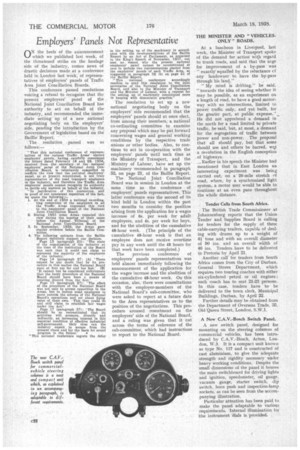Employers' Panels Not Representative
Page 68

If you've noticed an error in this article please click here to report it so we can fix it.
I-IN the heels of the announcement which we published last week, of the threatened strike on the haulage side of the industry, comes news of drastic decisions made at a conference held in•London last week, of representatives of employers' panels of Traffic Area Joint Conciliation Boards.
This conference passed resolutions voicing a refusal to recognize that the present employers' panel of the National Joint Conciliation Board has authority to act on behalf of the industry, and recommended the immediate setting up of a new national negotiating body on the employers' side, pending the introduction by the Government of -legislation based on the
Baillie Report: The resolution passed was as follows:— ,
"That this national conference of representatives of the various Traffic Areas' elected employers', panels, having carefully considered the letters dated February 18 and 28, 1958, received from the. secretary of the national employers panel of the National Joint Conciliation Board, ii reluctantly compelled to reaffirm the view that the national employers' panel, as at present constituted, is not truly representative of the road transport employers in the industry, and therefore the Traffic Area employers' panels cannot recognize its authority to decide any matters on behalf of the industry.
"In justification of this contention, and in proof of our consistent repetition of the fact, we quote the following:— 1. At the end of 1934 a national co-ordinating committee of the employers in all the Traffic Areas expressed this view to the employers' panel of the National Joint Conciliation Board.
2. During 1935 some Areas repeated this view during the hearing of their cases beton the Appeal Tribunal of the National Joint Conciliation Board,
5. In September, 1936, the Areas gave similar evidence before the Baillie Committee.
4. The following extracts from the Saline Report definitely support our decision. Page 13 Iparagraph 251: ' The state of the organization of the industry at the time of the institution of the Board was such that it could not claim to represent the majority of the employers of the industry. Page 14 (paragraph 27: _(A) ' There cannot be any doubt that by its procedure in this matter the National Board went at first too far end too fast.' (11) 'It cannot but be considered unfortunate that the hasty procedure of the National Board should have been a means of creating discord from the first.'
Page 15 (paragraph 27): 'The effect of the procedure of the National Board was not only to arouse opposition in the Areas, but to induce some employers to move outside the scheme of the National Board's operations and set about fixing rates of their own. This they could do and still claim to establish fair wages under the Act,' Page 17 (paragraph 57): ' The Board should be so reconstituted that its activities will promote, directly and indirectly, an increasing interest in this essential condition of effective industrial sell-government Only thus can the industry expect to serape from the present chaos and lay the basis for sound progress in the future.' " This national conference regrets the delay
in the setting up of the machinery in aecord• ance with the recommendations of the Baillie Report by an Act of Parliament, as promised in the King's Speech of November, 1957, out sees no reason why the present national employers' panel cannot be reconstituted 41 OM* to include two representatives elected from the employers' panels of each Traffic Area, as -suggested in paragraph 52 (b) on page 21 of the Bantle Report.
" This national conference accordingly resolves to send this resolution to the joint secretaries of the National Joint Conciliation Board, and also to the Minister of Transport and the Minister of Labour, with a request for the setting up of machinery constituted snore in keeping with democratic practice."
The resolution to set up a new national negotiating body on the employers' side recommended that the employers' panels should at once elect, from among their members, a national co-ordinating committee to examine any proposal which may be put forward concerning wages and general working conditions by the respective trade unions or other bodies. Also, to continue to act in co-operation with the employers' panels until such time as the Ministry of Transport, and the Ministry of Labour, have set up the machinery recommended in paragraph 52, on page 21, of the Baillie Report.
The National Joint Conciliation Board was in session in London at the same time as the conference of employers' panels representatives. This latter conference was the second of its kind held in London within the past two months to consider the position arising from the application for a wages increase of 6s. per week for adult employees, and 4s. per week for boys, and for the abolition of the cumulative 48-hour week. (The principle of the cumulative 48-hour week is that an employee does not receive overtime pay in any week until the 48 hours for that week have been completed.) The previous conference of employers' panels representatives was held almost immediately following the announcement of the application for the wages increase and the abolition of the cumulative 48-hour week. On this occasion, also, there were consultations with the employer-members of the National Board's sub-committee, who were asked to report at a future date to the Area representatives as to the position of the negotiations. This procedure aroused resentment on the employees' side of the National Board, and a ruling was given that it cut across the terms of reference of the sub-committee, which had instructions to report to the National Board.












































































































































